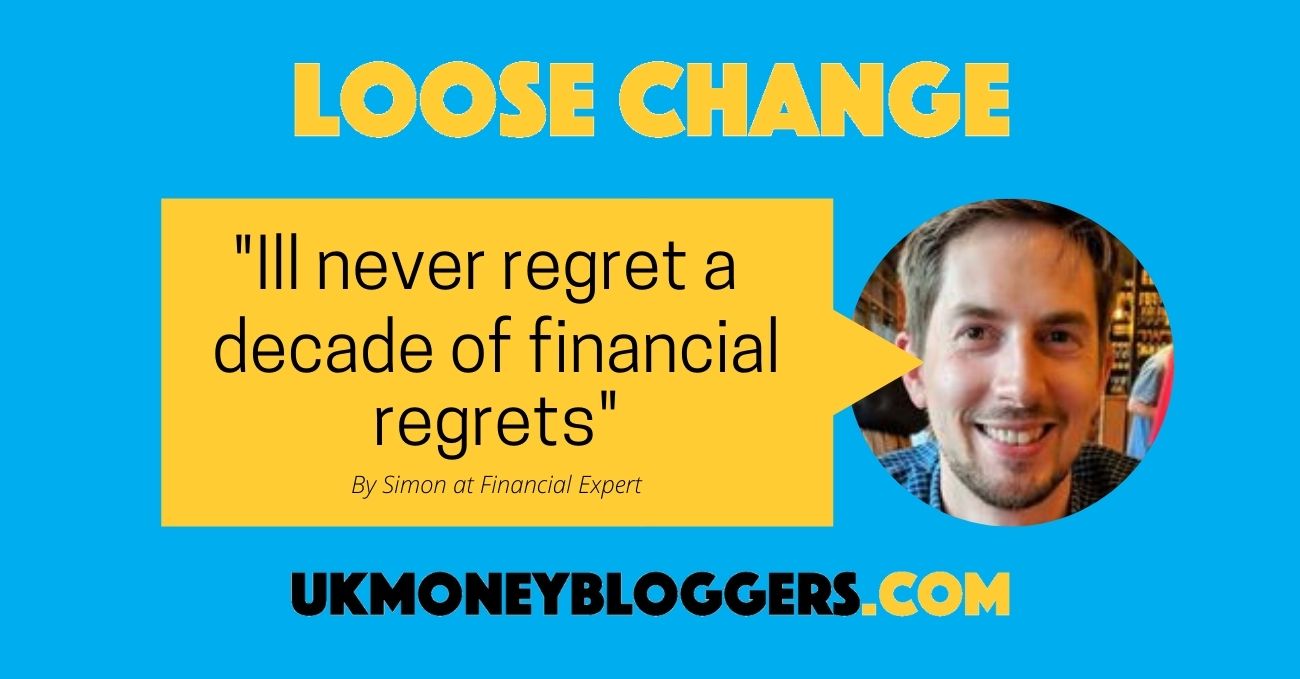Loose Change is a series of blogposts by members of the UK Money Blogger community where they let loose on a financial issue important to them.
This time Simon from Financial Expert talks about regret.
What is regret? Oxford Dictionary defines this unwelcome emotion as feeling sad, repentant, or disappointed over something that one has done or failed to do.
To regret is to be human
As we carve a path through life, we open up the doors to limitless possibility. Theoretically, I could have been Prime Minister of the UK or the CEO of a tech company by now. It was all technically possible!
But of course, that’s all quite abstract. When it comes to investing my calories in ruminating about steps (or missteps) I’ve taken, my brain prefers to focus on the more tangible decisions I’ve made. And usually, those decisions involve money.
There are a few investment decisions I’ve taken over the last ten years which don’t hold up well with hindsight:
- I didn’t invest in the stock market at the height of the 2008 financial crisis
- I didn’t ‘lean in’ to the stock market over the whole of the 2010s
- I sold shares at the outset of the Covid-19 pandemic
- I didn’t buy a serious amount of cryptocurrency
Which of my ‘mistakes’ was the most financially catastrophic?
Well, you could argue that none of them were. None of these mistakes cost me money in real terms. They do cause sharp pain though when I consider the opportunity cost.
The concept of opportunity cost is essentially the cost of having foregone the next best thing when you make a decision. It focuses on what I missed out on by making a decision. By failing to invest at the right times I have clearly lost out on plenty of financial returns.
For example; being uninvested at the height of the financial crisis didn’t result in me losing money – albeit I did lose access to some cash temporarily (tip of the hat to the Icelandic banking crisis). Instead, I could ask ‘What If?’ I had invested when the FTSE 100 was at 3,500? It’s now worth 7,600 at the time of writing.
What don’t I regret?
There have been some highlights, of course, amongst the missed opportunities.
For example, in 2015 I joined the Property Partner platform which allows investors to buy fractional shares in properties. I enthusiastically bought up shares in new listings and managed to inexplicably make a small profit by selling those shares on their secondary market once the transaction had closed. Noticing that a profit could be made, I recycled my money through the process of investing and selling multiple times in a year, generating returns of almost 50%.
I also don’t regret being ‘switched on’ to finance since I graduated from University all those years ago. I may not have been 100% invested ever since, but I’ve always had some exposure to the stock market and that will have benefited the bottom line.
But most of all, I don’t regret having these regrets. Investing in mistakes, and the embarrassment, annoyance or pain we feel after making them are some of the most powerful educational tools we possess.
I may struggle to recall the chemical symbol of Iron, but I have a sharp recall of any situation in which I lost £500 in a single day.
These events, however uncomfortable, guide us in our future decision making. Where I am too adventurous, regrets urge me to be cautious. And where I am too prudent, regrets urge me to take a chance.
They’re subtle but at the same time, they are powerful pieces of advice, waiting to be whispered in my ear when the time is right.
Annoying as it is to not have a perfect record, this isn’t a useful or practical aspiration to have mid-way through adulthood. There probably isn’t a living soul who invested in Microsoft in the 1990s, Apple in the 2000s, Tesla in the 2010s then DogeCoin in the 2020s. So let’s not kid ourselves – we’ve all made blunders or have missed out on the easy lottery ticket to wealth.
So that’s why I believe that my regrets are something to be acknowledged, shared and even celebrated. They’re no more or less than bitesize anecdotes that will help me (or a family member/friend) do better next time around.
——
Articles in the Loose Change series are written by members of our community. The views do not necessarily represent those of UK Money Bloggers or other members. The articles should not be taken as financial advice.

